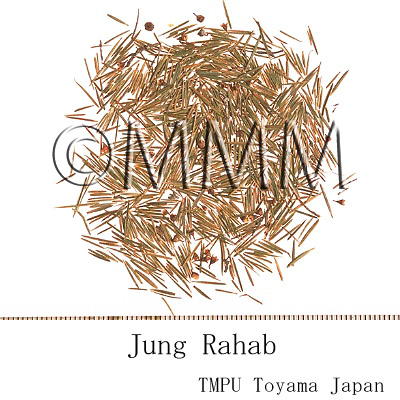Crude drug sample data base
※Click on the image to enlarge it.
Scientific information data base
| Crude drug name | Indonesian name, English name | Jungrahab | ||||
|---|---|---|---|---|---|---|
| Synonyms | Ujung atap | |||||
| crude drug image |
| |||||
| Original plant name | Baeckea frutescens Linn. | |||||
| Family name | Myrtaceae | |||||
| Used part | Leaves, roots | |||||
| Distribution area | It is widespread from South-East Asia to Australia, including southern China, Thailand, Peninsular Malaysia, Sumatra, Borneo, Sulawesi, New Guinea. It is not known to occur in Java. In Borneo, it occurs in swamp forest in lowlands [201, 220]. | |||||
| Description | Leaves are opposite, needle-like, 6-15 mm x 0.4-0.8 mm, base narrowly cuneate, apex obtuse or acute, margin entire, resinous aromatic when crushed [220]. The plant is a shrub or a small tree up to 8 m tall, bark greyish brown, fissured and flaky; wood red, very hard, dense and heavy; inflorescence axillary, 1-flowered, corolla white, oil glands present. Fruits a hemispherical to campanulate capsule opening by 3-4 longitudinal slits [220]. | |||||
| Drug effect | Hot, aromatic, analgesic, antispasmodic, tonic, diuretic [231]. | |||||
| Specific actions | Antispasmodic, emmenagogue [201, 220]. | |||||
| Frequency in use | Abundant | |||||
| Pharmacological effect | The essential oil at dose of 435 mg / kg exhibited antihepatotoxic activity against artificially induced liver injury in mice [220]. A chromone constituent, 5-Hydroxy-2-isopropyl-7-methoxychromone and four analogues, have been isolated from the aerial parts of Baeckea frutescens. All of them exhibited toxicity to the brine shrimp Artemia salina [PMID:12932146]. The methanol extracts of Baeckea frutescens exhibited potent antibacterial activity against the cariogenic bacterium Streptococcus mutans [PMID:15351117]. | |||||
| Medical system | Indonesian medicine (Jamu) | |||||
| Traditional usage | Tea made from leaves is used as healthy tonic drinks. Tea is also used for fever and fatique. It is one of the important ingredients of an Indonesian traditional formula namely ''jamu peluntur'' that is used after childbirth to enhance uterine cleansing and recovery of the womb. It also used as emmenagogue. Batak tribe in Sumatra Island (Indonesia) used the leaves as a diuretic and abortivum [201]. | |||||
| Formulation | 1) Irregular menstruation and after childbirth: 6 grams of leaves of B. frutescens, 3 grams of aboveground parts of Achillea millefolium are boiled or steeped with 110 ml of water. Drink 100 ml of the infusion once a day for 4 days, start from 4 days before menstruation [231]. 2) Rheumatism: 8 grams of roots of B. frutescens is boiled with 110ml of water to make a decoction. Drink the decoction 100 ml once a day for 7 days. Drink 100 ml of the decoction 3 times a week for maintenance [231]. | |||||
| References | Reference book Tips! | [201] K. Heyne, Tumbuhan Berguna Indonesia, Vols. 1-4, 1987. Diedarkan Oleh Koperasi Karyawan Departemen Kehutanan, Jakarta, Indonesia. Vol. 3, pp 1534-1535. [220] van Valkenburg, J.L.C.H. and Bunyapraphatsara, N. (editors). Plant Resources of South-East Asia No. 12 (2). Medicinal and posionous plants 2. Prosea Foundation, Bogor, Indonesia, 2002. pp 96-98. [231] Soedibyo, Mooryati: Alam Sumber Kesehatan: Manfaat dan Kegunaan (Natural resources for health. Benefits and uses). Balai Pustaka. 1998. pp 180-181. | ||||
| Research paper | 1. Gray CA, Kaye PT, Nchinda AT. Anticariogenic activity of some tropical medicinal plants against Streptococcus mutans. Fitoterapia, 75(6):596-8, 2004. (PMID: 12932146) 2. Hwang JK, Shim JS, Chung JY. Chromone studies. Part 13. Synthesis and electron-impact mass spectrometric studies of 5-hydroxy-2-isopropyl-7-methoxychromone, a constituent of the medicinal plant Baeckea frutescens, and side-chain analogues. J Nat Prod., 66(8):1144-6, 2003. (PMID: 15351117) | |||||
| Remarks | The presence of some active compounds such as chromone-derivatives, flavanones and phloroglucinols might be of interest [220]. | |||||
| Last renewal date | 2024/03/06 | |||||







